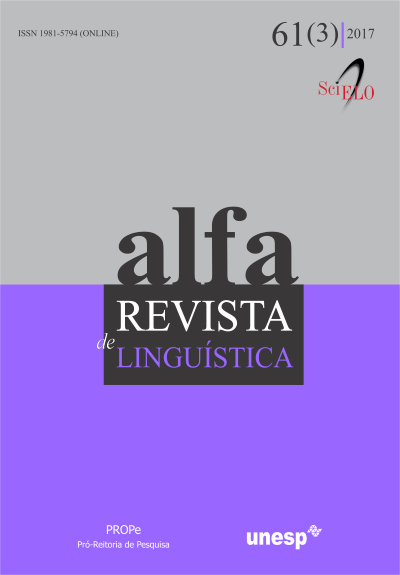Order, distributivity and attraction during agreement production
DOI:
https://doi.org/10.1590/1981-5794-1711-1Keywords:
Psycholinguistics, Sentence production, Agreement, Linear order, Distributivity, Spanish,Abstract
Several studies have found that factors of different nature (semantic, morphological and syntactic) affect the computation of subject-verb agreement during sentence production (Bock & Miller, 1991; Franck et al., 2002; Hartsuiker et al., 2001; Haskell & MacDonald 2003; Vigliocco et al. 1995, 1996). The aims of this paper are: a) to investigate the influence of the linear order of constituents, exploiting the relative flexibility of Spanish; b) inquire whether a semantic variable, such as distributive reading, and a morphological variable, such as manipulation of the number of local noun, are factors that affect the processing of the agreement. We designed an experiment using an image description task with preambles in which the order of the subject of the sentence (pre-verbal or post-verbal), the type of preamble (nominal phrases with distributive and non-distributive reading) and the number of the local noun (singular-plural) was manipulated. The results showed a main effect of the local noun number, the type of preamble and the linear order of the constituents: more subject-verb agreement errors occurred when the sentence presented an asymmetry in the number of nouns (N1 Singular- N2 Plural), the phrases had a distributive reading and the order was subject-verb. The results seem to indicate that syntactic, semantic and morphological factors interfere together in the agreement processing in Spanish and support the postulates of the interactive models of agreement production. In addition, they provide evidence to a general processing model in which the different factors work as keys to the retrieval of information in the agreement computation (Badecker & Kuminiak 2007).Downloads
Download data is not yet available.
Downloads
Published
19/12/2017
How to Cite
SÁNCHEZ, M. E.; JAICHENCO, V.; SEVILLA, Y. Order, distributivity and attraction during agreement production. ALFA: Revista de Linguística, São Paulo, v. 61, n. 3, 2017. DOI: 10.1590/1981-5794-1711-1. Disponível em: https://periodicos.fclar.unesp.br/alfa/article/view/9177. Acesso em: 14 jan. 2026.
Issue
Section
Papers
License
Manuscripts accepted for publication and published are property of Alfa: Revista de Linguística. It is forbidden the full or partial submission of the manuscript to any other journal. Authors are solely responsible for the article's content. Translation into another language without written permission from the Editor advised by the Editorial Board is prohibited.

